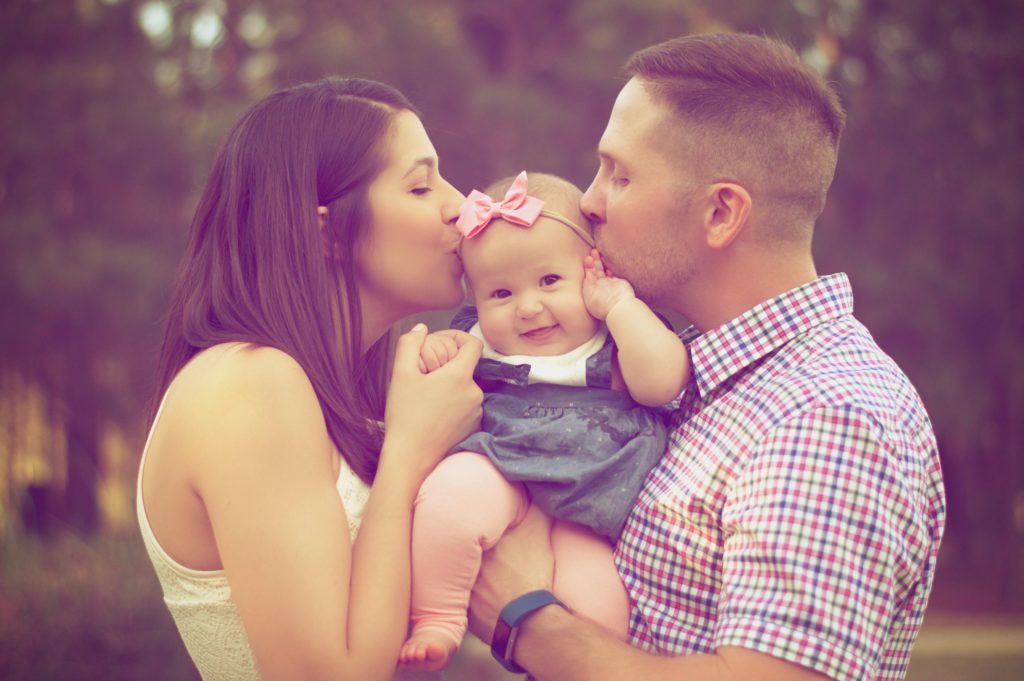
Sarah Driscoll had looked forward to her first pregnancy for years.
She had to complete her graduate degree first, so she could relax and enjoy every moment. Now she was pregnant, and it was going well. Every visit to the doctor revealed more growth in her baby. It was an exciting time. But as her delivery date approached, something seemed off. She’d heard of depression in pregnant moms but she had no reason to be depressed!
Still, rather than feeling excited about her baby’s birth, she found herself with mixed feelings. The idea of the work ahead, the sleepless nights, the exhaustion… began to weigh on her. Each day she felt more nervous about it than the day before.
She mentioned her fears to her husband who reassured her that it would probably all fall into place once she saw her beautiful baby’s face. She secretly hoped so, but was skeptical.
One day she asked her mom if she felt the same way before her first baby, and her mom told her no, she was so excited about having the baby in her arms, she didn’t care what it required of her.
That just made her feel more selfish and guilty.
Her best friend chimed in with a similar perspective, except admitted she was worried whether she would be able to handle everything after her third baby was born. But she reassured Sarah that it turned out to not be a problem. Caring for her 3 children was not so hard to take in stride.
Sarah’s anxiety rose higher and higher, and by the time she began having labor contractions, she felt exhausted about the whole thing.
After 9 hours of labor, her baby boy was born healthy, looking around the room with big bright eyes. And he quickly began to nurse when the doctor placed him on her chest.
Postpartum isn’t always a fairy tale
Sarah felt she should feel happier. Pangs of guilt shot through her that she felt so little for this beautiful baby boy. Her lack of emotion seemed to confirm she just wasn’t fit to be a mother. And now this poor child was stuck with her. What should she do?
The first 2 weeks after he was born seemed like a test of endurance. How long can you live without sleep, she wondered. She went through the motions of changing diapers, feeding, and holding this baby. But she felt like a robot. And she was consumed with guilt.
Help Arrived: Her Sister Came to Visit
When her sister came to visit, Sarah tried to be a hostess in her exhausted, bedraggled state. Her sister sensed she wasn’t doing well and finally asked.
“How are you feeling emotionally..?”
Sarah’s chin quivered. “I feel like a terrible mom. I love my baby but I don’t feel it. I’m so tired. I thought this would be a happy time….”

Her sister wrapped her arms around her.
“Sarah. You’re NOT a terrible mom. But you do need some rest and a chance to see the doctor. Tell you what. Go to bed. Let me take over with Jake. I’ll love every minute of it and you need rest. Then we can talk more.”
No surprise, the nap helped Sarah feel revived, but it didn’t help the empty, blank, nervous feeling go away. So she Said that to her sister… who told her she had a friend who was diagnosed with postpartum depression and had described feelings kind of like Sarah did.
She suggested they make an appointment to see the doctor, who then referred Sarah to his trusted psychiatrist friend. That psychiatrist explained that depression in pregnant moms happens sometimes. She recommended a special treatment that could give Sarah rejuvenation in her emotions, her bond with little Jake, and hope for the future.
She called it IV ketamine treatment. Sarah had never heard of it, and her only concern was whether it would hurt her baby through her breastmilk.
The doctor explained how it worked, how quickly it’s eliminated, and how infusions are usually scheduled, but if she liked she could pump her breast milk for the next 2-3 weeks then resume breastfeeding afterwards. Sarah was fine with that, and frankly was game to try anything at that point…
We don’t talk about depression in pregnant moms very often, do we?
In fact, at this point it’s been nearly 2 years since the last time. But treating depression is important. And when it comes to bringing a child into the world, that depression may have a reach beyond just you. It may impact your baby as well.
A study published in the American Journal of Psychiatry this past September authored by Zou, Tiemeier, et al, showed that maternal depressive symptoms during the time before and after childbirth actually can affect the development of the baby’s brain.
For the study, researchers collected data from 3469 mothers and their babies related to whether the mother experienced depression symptoms during pregnancy and afterward, through the baby’s childhood up to age 10. They measured behavioral and emotional problems in these children, at the end when the children were ten years old.
Children were assessed at age 2 months, 3 years, and 10 years. The timing of the mother’s depressive symptoms were charted as they pertained to these age points.
What they found out was that at the age of 2 months, babies whose mothers had been depressed had less gray matter — meaning the volume of their brain was smaller. They also had less white matter, which is the areas of the brain where brain cell connections happen. The color is the result of the myelin that covers and protects these circuits.
This was not the case in older children, but was significant at the 2 month mark after birth.
However, those children who had these changes at two months were more likely to have attention deficit problems at 10 years. Depression in pregnant moms can have a lasting effect in their children.
Preparing for Your Child’s Best Future

Seems pretty important, doesn’t it?
Especially as you plan and prepare for conception. If you’ve been depressed, and medicines haven’t helped, consider IV ketamine treatment before you get pregnant.
On the other hand, we all know that not all pregnancies are carefully planned. So what happens if you find out you’re pregnant and you’re also depressed?
The FDA classifies ketamine as a Category B drug, meaning it is believed to be relatively safe during pregnancy, but it really hasn’t been adequately studied during pregnancy yet.
You Have Options
The good news is that you can wait until the baby is born, then receive ketamine treatment to hopefully relieve the depression symptoms right after your baby is born.
As always, remember that ketamine isn’t for everyone. But those who’ve been severely depressed and not helped by traditional medications are usually dramatically improved with IV ketamine treatment, even to achieving remission.
With that said, the best hope for you to have the well-being to bond with your baby, and to enjoy your life and motherhood, may lie in ketamine treatment.
And just as important as your wellbeing, is your baby’s brain health and development during infancy and childhood. If your wellbeing could protect your baby from attention deficit problems later.. well, that’s a no-brainer. Right??
We think about prenatal vitamins, exercise, and childbirth classes. But the idea of IV ketamine treatment before pregnancy hasn’t really been on the list, you know?
That’s because we didn’t have the info we have now about the effect of depression in pregnant moms on the developing baby.
The more we learn, the more we can do to give our babies the best possible start in life. And the beauty of it is, taking care of baby this way will help you enjoy life, too.
Moms, Dads, and Babies All Live Better
At Innovative Psychiatry, we like to see moms come in for IV ketamine treatment because they deserve to feel good, to have the joy, energy, and initiative to give their families what they need, while enjoying their lives themselves.

But we’re especially happy for women who’d like to achieve remission from their life-long depression before they start their family.
What a wonderful beginning. But you know what? It’s not just about moms, either. It’s also about dads.
And when a dad realizes he wants a child but is depressed, this may be the ideal time to reach out for treatment and the potential of remission. Because if he hasn’t benefitted from other medicines, he may be a great candidate for IV ketamine treatment. It can help him be the best dad he can be…and enjoy his life and family to the fullest.
Wouldn’t you love to have the zest for life to enjoy your children, camping with the family, coaching your kids’ soccer team …dancing with your spouse? IV ketamine treatment can give you your life back, and give you the freedom and stamina to do things you love to do, the initiative to invest in your career and hobbies, and to build strong, lasting relationships.
If you’ve suffered from symptoms of disorders that hold you back from moving forward in your life, call us.
We want to help you plug in to a life that really matters to you.

To the restoration of your best self,
